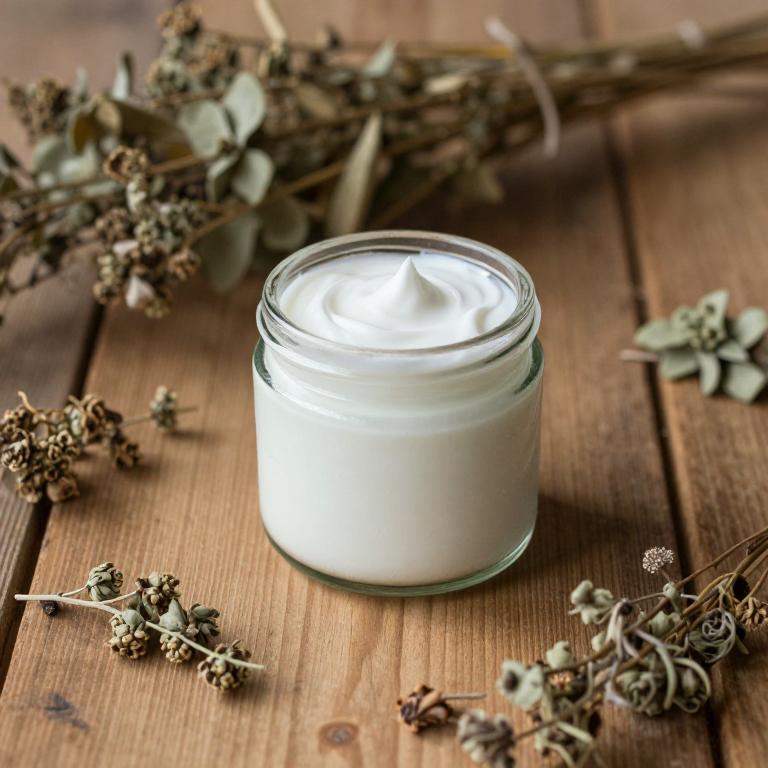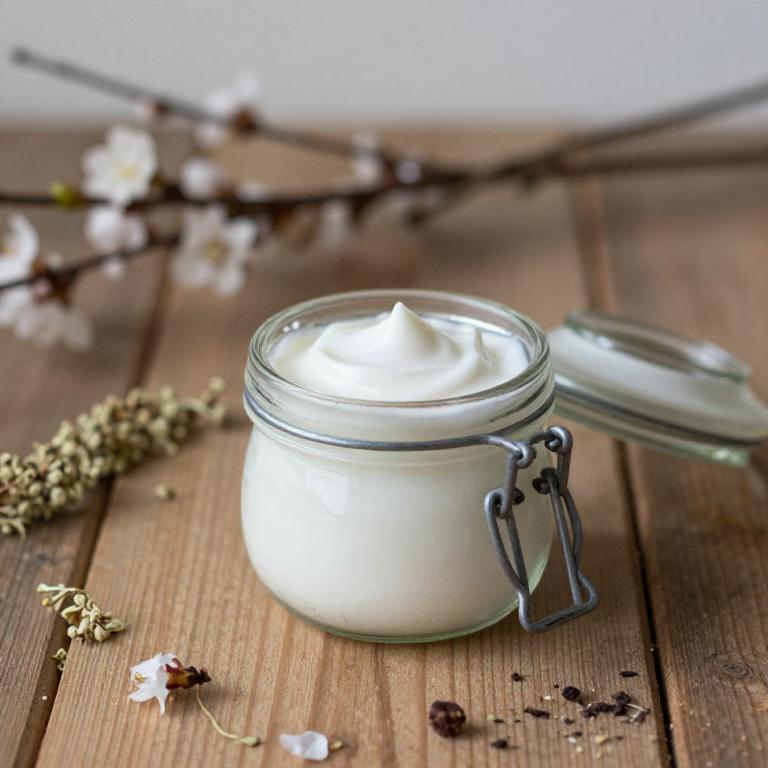10 Best Herbal Creams For Uterine Fibroids

Herbal creams for uterine fibroids are natural topical treatments that aim to reduce inflammation and alleviate symptoms associated with the condition.
These creams often contain ingredients like turmeric, ginger, and chamomile, which are known for their anti-inflammatory and soothing properties. While they may help with discomfort and support overall reproductive health, they are not a substitute for medical treatment and should be used under the guidance of a healthcare professional. Some studies suggest that certain herbs may inhibit the growth of fibroid cells, but more research is needed to confirm their effectiveness.
It is important for individuals to consult with a doctor before using herbal creams, especially if they are experiencing severe symptoms or have other underlying health conditions.
Table of Contents
- 1. Chaste tree (Vitex agnus-castus)
- 2. Turmeric (Curcuma longa)
- 3. Thistle (Silybum marianum)
- 4. Black cohosh (Cimicifuga racemosa)
- 5. Stinging nettle (Urtica dioica)
- 6. Ginger (Zingiber officinale)
- 7. Dog rose (Rosa canina)
- 8. European plum (Prunus domestica)
- 9. Licorice (Glycyrrhiza glabra)
- 10. Echinacea (Echinacea purpurea)
1. Chaste tree (Vitex agnus-castus)

Vitex agnus-castus, commonly known as chasteberry, is often used in herbal creams to support hormonal balance and may help manage symptoms associated with uterine fibroids.
These creams typically contain extracts of the Vitex plant, which is believed to influence the pituitary gland and regulate estrogen levels in the body. While not a cure for fibroids, some studies suggest that Vitex may reduce the size of fibroids and alleviate related symptoms such as heavy menstrual bleeding and pelvic pain. Herbal creams containing Vitex are often used as a complementary therapy alongside conventional treatments.
However, it is important to consult with a healthcare provider before using these products, as they may interact with other medications or have side effects.
2. Turmeric (Curcuma longa)

Curcuma longa, commonly known as turmeric, contains curcumin, a compound with potent anti-inflammatory and antioxidant properties.
Some herbal creams infused with curcumin are being explored as complementary treatments for uterine fibroids due to their potential to reduce inflammation and inhibit the growth of fibroid tissue. While these creams may offer some relief from associated symptoms like pain and swelling, they are not a substitute for medical treatment and should be used under the guidance of a healthcare professional. Research on their efficacy for uterine fibroids is still limited, and more clinical studies are needed to confirm their benefits.
It is important to consult with a doctor before using any herbal remedies, especially for conditions like uterine fibroids, to ensure safety and appropriateness.
3. Thistle (Silybum marianum)

Silybum marianum, also known as milk thistle, is a herb traditionally used for its potential liver-protecting properties, but it has also been explored for its possible effects on uterine fibroids.
Some studies suggest that the active compound silymarin in milk thistle may help reduce inflammation and inhibit the growth of fibroid tissue by modulating hormonal activity and antioxidant pathways. Herbal creams containing silybum marianum are sometimes used topically to support overall uterine health and alleviate symptoms associated with fibroids, such as bloating and discomfort. However, it is important to note that while these creams may offer some supportive benefits, they should not replace conventional medical treatments for fibroids.
As with any herbal remedy, it is advisable to consult a healthcare provider before using silybum marianum creams, especially for individuals with existing medical conditions or those taking other medications.
4. Black cohosh (Cimicifuga racemosa)

Cimicifuga racemosa, commonly known as black cohosh, is a herb that has been traditionally used to support hormonal balance and alleviate symptoms related to menstruation and menopause.
While it is not a cure for uterine fibroids, some herbal creams containing Cimicifuga racemosa may be used as a complementary therapy to help manage associated symptoms such as pain and inflammation. These creams are often applied topically to the abdomen or lower back to provide localized relief, though their effectiveness in reducing fibroid size is not well-established by scientific research. It is important to consult with a healthcare provider before using any herbal remedies, especially for conditions like uterine fibroids, to ensure safety and appropriateness.
As with all herbal treatments, results may vary, and they should not replace conventional medical care.
5. Stinging nettle (Urtica dioica)

Urtica dioica, commonly known as stinging nettle, has been traditionally used in herbal medicine for its potential health benefits, including its use in topical creams for uterine fibroids.
These creams are formulated with extracts from the leaves and roots of Urtica dioica, which are believed to have anti-inflammatory and detoxifying properties. Some studies suggest that the compounds in stinging nettle may help reduce the size of fibroids by promoting the elimination of excess estrogen and supporting hormonal balance. However, while some individuals report relief from symptoms such as bloating and pain, scientific evidence supporting the efficacy of Urtica dioica creams for uterine fibroids remains limited.
It is important to consult with a healthcare provider before using any herbal remedy, especially for conditions like uterine fibroids, to ensure safety and appropriateness.
6. Ginger (Zingiber officinale)

Zingiber officinale, commonly known as ginger, has been traditionally used for its anti-inflammatory and antioxidant properties, and some herbal creams containing ginger extract are being explored for their potential benefits in managing symptoms associated with uterine fibroids.
These creams may help reduce inflammation and pain, which are common symptoms in women with fibroid-related conditions. While there is limited scientific evidence supporting the effectiveness of ginger-based topical treatments for uterine fibroids, some studies suggest that ginger may inhibit the growth of fibroid cells in laboratory settings. It is important to consult a healthcare provider before using any herbal remedy, as fibroids can vary in type and severity.
Overall, ginger herbal creams may offer a natural alternative for symptom relief, but they should not replace conventional medical treatments.
7. Dog rose (Rosa canina)

Rosa canina, also known as dog rose, is a traditional herbal remedy that has been used for its anti-inflammatory and antioxidant properties.
Some herbal creams containing Rosa canina are marketed for their potential to support women's reproductive health, including the management of uterine fibroids. These creams may help reduce inflammation and oxidative stress, which are often associated with fibroid growth. While there is limited scientific evidence supporting their efficacy for uterine fibroids, some users report symptomatic relief and improved comfort.
As with any herbal treatment, it is important to consult with a healthcare provider before use, especially for individuals with existing medical conditions or those undergoing other treatments.
8. European plum (Prunus domestica)

Prunus domestica, commonly known as the European plum, has been traditionally used in herbal remedies for its potential health benefits.
While there is limited scientific evidence supporting its direct efficacy in treating uterine fibroids, some studies suggest that compounds found in plums, such as flavonoids and phenolic acids, may have anti-inflammatory and antioxidant properties that could support overall reproductive health. Herbal creams containing Prunus domestica are often marketed for their ability to reduce inflammation and improve circulation, which may indirectly support the management of fibroid-related symptoms. However, it is important to note that these creams should not be considered a substitute for medical treatment and should be used under the guidance of a healthcare professional.
Always consult with a doctor before using any herbal remedy, especially for conditions like uterine fibroids, to ensure safety and appropriateness.
9. Licorice (Glycyrrhiza glabra)

Glycyrrhiza glabra, commonly known as licorice root, has been traditionally used in herbal medicine for its anti-inflammatory and soothing properties.
Some herbal creams containing licorice extract are being explored for their potential to reduce inflammation associated with uterine fibroids, although scientific evidence supporting their efficacy for this specific condition is limited. These creams may help alleviate symptoms such as pain and swelling by promoting skin healing and reducing irritation. However, it is important to note that licorice root can have side effects, including increased blood pressure, and should not be used as a substitute for medical treatment.
Always consult a healthcare professional before using any herbal remedy for uterine fibroids.
10. Echinacea (Echinacea purpurea)

Echinacea purpurea, commonly known as purple coneflower, is traditionally used for its immune-boosting properties, but recent research has explored its potential in herbal creams for managing uterine fibroids.
These creams often contain echinacea extract combined with other herbal ingredients, such as green tea or turmeric, which are believed to have anti-inflammatory and antioxidant effects. While there is limited scientific evidence supporting the efficacy of echinacea creams specifically for uterine fibroids, some users report reduced symptoms like pain and inflammation. It is important to consult a healthcare provider before using such products, as they may interact with other medications or treatments.
Overall, echinacea-based creams may offer a complementary approach for symptom relief, though they should not replace conventional medical care for fibroid management.